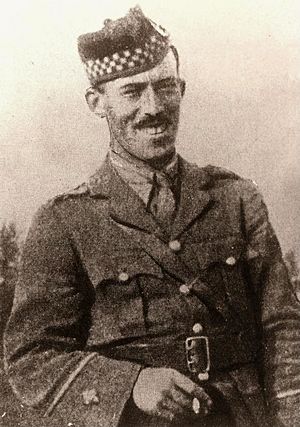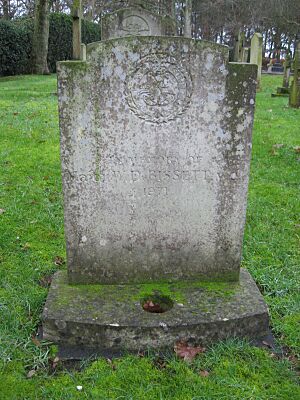William Davidson Bissett facts for kids
Quick facts for kids
William Davidson Bissett
|
|
|---|---|

William Davidson Bissett VC in 1918
|
|
| Born | 17 August 1893 St Martins, Perthshire |
| Died | 12 May 1971 (aged 77) Wrexham, Wales |
| Buried |
Aldershot Military Cemetery
(Cremated in Pentre Bychan, Wrexham) |
| Allegiance | |
| Service/ |
|
| Rank | Major |
| Unit | Argyll and Sutherland Highlanders Royal Army Ordnance Corps Royal Pioneer Corps |
| Battles/wars | World War I World War II |
| Awards | Victoria Cross Croix de Guerre avec Palme (France) |
Major William Davidson Bissett was a brave Scottish soldier. He received the Victoria Cross (VC), which is the highest award for bravery in the face of the enemy. This special medal is given to soldiers from the United Kingdom and Commonwealth countries.
Contents
Early Life and Family
William Davidson Bissett was born on August 7, 1893. His hometown was St Martins in Perthshire, Scotland. His father, John Bissett, worked as a plumber. His mother was Helen Davidson Bissett. William was their older son.
Joining the Army
William Bissett joined the British Army during the First World War. On December 19, 1916, he became a second lieutenant. This means he was an officer in the Argyll and Sutherland Highlanders, a famous Scottish regiment.
A Heroic Act in World War I
In 1918, William Bissett was 25 years old. He was a lieutenant leading a group of soldiers. On October 25, 1918, his unit was fighting in Maing, France. During the battle, many soldiers were injured. Lieutenant Bissett bravely took charge of the whole company.
The enemy launched a surprise attack. They tried to go around his soldiers from the left side. William Bissett saw the danger. He quickly moved his soldiers back to a railway line. But the enemy kept coming forward.
When his soldiers ran out of bullets, Lieutenant Bissett knew he had to act fast. He climbed onto the railway bank, even though enemy fire was very heavy. He shouted for his soldiers to charge with their bayonets. A bayonet is a knife attached to the end of a rifle.
His brave charge pushed the enemy back. Many enemy soldiers were defeated. Lieutenant Bissett then led his soldiers forward again. He set up a new strong line of defense. His quick thinking and courage saved a very difficult situation for his unit. For this amazing act, he was given the Victoria Cross. He also received the French Croix de Guerre medal in December 1919.
Service in World War II
William Bissett continued to serve in the army. During the Second World War, he worked with the Royal Army Ordnance Corps and the Royal Pioneer Corps. These groups helped supply the army and build important things. When he retired in September 1945, he was given the honorary rank of major.
Later Life and Legacy
William Bissett passed away on May 12, 1971, in Wrexham, Wales. His ashes were buried in the Aldershot Military Cemetery in Aldershot Military Town, England.
Today, you can see his Victoria Cross medal. It is on display at the Argyll and Sutherland Highlanders Museum. This museum is located inside Stirling Castle in Scotland. It helps people remember his bravery and service.
 | Aaron Henry |
 | T. R. M. Howard |
 | Jesse Jackson |


